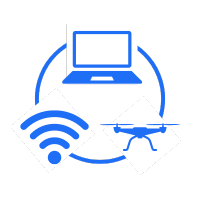"If quantum mechanics hasn't profoundly shocked you, you haven't understood it yet." -Niels Bohr
Quantum computing is a rapidly developing technology with the potential to revolutionize many different industries. By harnessing the power of quantum mechanics, quantum computers can solve problems that are impossible with classical computing.
In this blog post, we'll explore what quantum computing is and how it works.
Then, we'll discuss some of the current applications and potential future applications of this technology. Finally, we'll touch on some challenges that need to be addressed before quantum computing can reach its full potential.
Key Takeaways
Quantum communication could revolutionize internet infrastructure and provide faster routing algorithms for cloud computing services.
Quantum sensing networks allow companies to collect data from previously inaccessible locations or areas of the environment or infrastructure.
Quantum sensing has applications in medical diagnostics and security systems. It also opens up opportunities for new research into quantum computing and quantum cryptography that have the potential to improve society’s quality of life.
Even though quantum computing has many positive applications, it has some negative implications as well. Future quantum computers may be able to crack even the most sophisticated encryption. There is a need for post-quantum cryptography in 2023 and beyond.
What is Quantum Computing?
Quantum computing is a powerful emerging technology that utilizes the principles of quantum mechanics to process data. It uses particles such as electrons, photons, and ions to create powerful computers that can solve complex problems much more quickly than traditional computers.
Quantum computing has the potential to revolutionize many fields by allowing us to analyze large amounts of data in ways previously thought to be impossible. Quantum computing could also help us find solutions for some of humanity’s most complicated and pressing problems, such as climate change and cancer.
What are Quantum Computers?
Quantum computers are a type of computer that use quantum-mechanical phenomena, such as superposition, to perform operations on data. Unlike classical computers that use binary digits called bits to store and process data, quantum computers use quantum bits called qubits which can exist in multiple states at once.
This allows quantum algorithms to potentially solve certain problems much faster than traditional methods and make calculations that today's computers would find impossible. Quantum computing is still in its early stages but has the potential to revolutionize many aspects of our lives in the verynear future.
A Brief History of Quantum Computing
Quantum computing has been a subject of interest since the mid-1980s when theoretical physicist Richard Feynman proposed that due to the physical limitations of classical computing, a quantum computer might be capable of performing calculations significantly faster.
Since then, research into quantum computing has accelerated rapidly. Today, it is being used for many applications, including cryptography, image processing, data analysis, and even drug development.
While there are still many challenges to tackle before quantum computers are commonplace, researchers worldwide are working hard to make this technology more accessible and increasingly affordable.
Quantum mechanics and computer science were first combined with the invention of the Quantum Turing Machine. This innovative machine could simulate quantum systems using binary data and quantum algorithms.
Researchers have continued to develop new ways to apply quantum computing, including combining it with artificial intelligence to create self-learning systems that can operate at speeds far beyond those of traditional computers.
Thanks to advances in hardware and theoretical research, we get a bit closer to unlocking the full potential of this powerful technology every day. Some reports estimate that there may even be between 2,000 and 5,000 quantum computers in use worldwide by 2030.
Implications of Quantum Computing
The implications of quantum computing are far-reaching and have the potential to revolutionize many industries. For example, quantum computing could help improve security by facilitating the development of codes that are impossible to hack. Quantum computing can also speed up artificial intelligence, more effectively analyze large datasets, and make more accurate weather predictions.
Quantum computing can also have a significant impact on the medical field, such as providing faster ways to search through genetic sequences to find potential treatments for diseases. Finally, quantum computers could enable scientists to simulate complex quantum systems in real-time, leading to accelerated discoveries in chemistry and physics.
Why Should Businesses Use Quantum Computing?
Quantum computing is a powerful tool that can help businesses make more money by providing them with increased computational power and data processing capabilities. This can help businesses speed up the process of making decisions, reduce costs, and gain competitive advantages in the market.
For example, quantum computing can provide more accurate predictions for stock markets and better analysis of large customer databases. According to a McKinsey report, the automobile industry will be one of the industries most affected by quantum computing, with a significant influence beginning around 2025. By 2030, they predict that associated technologies will have an economic impact on the automotive sector of $2 to $3 billion. Quantum computing in the automotive industry could significantly improve the design of materials, create more predictive crash simulations, and optimize the supply chain for battery manufacturing.
With its enormous potential, quantum computing could be the key to unlocking unprecedented opportunities and advantages for a wide variety of businesses if utilized effectively.
How Are Companies Already Using Quantum Computing?
Quantum computing continues to make strides forward with advancements in technology and research. Recent breakthroughs have made it possible for quantum computers to process data more quickly and efficiently than ever before, allowing them to tackle problems that were previously too complex or time-consuming to solve.
Companies like Google, Microsoft, and IBM are investing heavily in quantum computing research, finding new ways to leverage this powerful tool for both theoretical and practical applications. With the development of dedicated quantum hardware and cloud-based platforms, businesses of all sizes now have access to this powerful technology which can prove useful in a wide variety of contexts.
Quantum Computing and Cybersecurity
Quantum computing has the potential to revolutionize cybersecurity, providing levels of protection that have been impossible to achieve with traditional computing methods. It could enable the development of codes that are impossible to crack, even with the most advanced supercomputers. Quantum computing opens up a world of possibilities for cybersecurity by offering powerful encryption and authentication capabilities that are virtually unbreakable, allowing businesses to protect their data from malicious actors.
Quantum computing also offers unprecedented authentication capabilities, allowing companies to verify the identity of users and prevent unauthorized access to sensitive data. Quantum algorithms can also lower the time it takes to identify cybersecurity threats. Quantum Computing has already revolutionized the field of cybersecurity. However, its full implications are still yet to be realized.
It is still crucial to follow best practices for data security and take advantage of existing cybersecurity products, such as our Data Defense software, to ensure that your sensitive data is secure.
The Government’s Concerns Regarding Quantum Computing
The government is concerned about quantum computing due to its potential for cybersecurity threats. As quantum computers become more powerful and their capabilities increase, so too does the threat of malicious actors finding ways to exploit the technology for their own gain. There is a real risk that quantum computing could be used to break encryption codes, allowing hackers to access sensitive information and disrupt networks.
Furthermore, this computing power could be used to create powerful algorithms which can easily identify cybersecurity flaws in real time. The government is also worried about how quantum computers could change the balance of power within countries, as they would give certain nations a powerful advantage over others in terms of data processing speed, cybersecurity, and artificial intelligence capabilities. Apart from these security concerns, there are other issues that the government has yet to address when using quantum computing technology such as privacy rights, market manipulation, and more.
What is the Quantum Computing Cybersecurity Preparedness Act?
Because the impact of quantum computing is expected to be so significant, many experts believe that it is important to begin to prepare for it now. There is a possibility that some people might already be stealing data, now knowing that quantum computing will eventually make the data decryptable. This concern, among others, is why there was bipartisan support for the Quantum Computing Cybersecurity Preparedness Act.
Lawmakers recognize that it is important to prioritize quantum computing today in order to prepare for the future and get ahead of the competition. One outcome of the Quantum Computing Cybersecurity Preparedness Act is that the Office of Management and Budget has been given the task of upgrading the code used for internal communications to post-quantum cryptography, meaning code that is impossible to decrypt even with quantum computing.
Rep. Ro Khanna (D-Calif.) said that “there is a race to build a fully capable quantum computer that would be so powerful, it could break encryption and allow adversaries to steal valuable information.” This forward-thinking legislation is a big step for the United States as it sets the nation on a path to become the world leader in both quantum computing and overall cybersecurity. The NSA forecasts that this transition to post-quantum cryptography will be done by 2035.
Important Concepts For Quantum Computing:
What is Quantum Mechanics?
Quantum Mechanics is a branch of quantum physics that describes how matter and energy interact on the subatomic level. It explains in detail the behavior of particles and their interactions with each other, such as quantum entanglement.
According to quantum mechanics, particles exist in a range of potential states known as quantum states. These can become “real” when an observer measures the value of a particle’s property. In addition to this wave–particle duality, quantum mechanics also postulates that particles are intrinsically probabilistic - meaning that their behavior is determined by probability rather than certainty.
This idea has been experimentally verified by numerous experiments, such as the double-slit experiment. This experiment demonstrates how quantum mechanical phenomena are probabilistic. It shows that light and matter can be like both classically defined waves and particles.
It has led to the development of quantum computing and quantum cryptography, two powerful new technologies enabled by quantum mechanics.
In addition to its implications for computing, quantum mechanics has provided scientists with numerous other insights. For example, it has allowed us to understand how the universe works fundamentally and make predictions about phenomena at microscopic scales. (For example, predicting the existence of antimatter.)
What is Quantum Entanglement?
Quantum entanglement, one of the most counterintuitive concepts in quantum mechanics, implies that two objects separated by vast distances can still be intimately linked together and influence each other’s behavior even if they never interact directly – something Einstein famously described as “spooky action at a distance.”
Quantum entanglement enables quantum computers to perform calculations exponentially faster than classical computers by leveraging the power of quantum parallelism and quantum superposition. It also facilitates communication between quantum systems over long distances, allowing for secure data transmission and communications that are impossible with traditional computing methods.
In addition to these practical applications, quantum entanglement is an incredibly fascinating topic in itself. It has been studied extensively by researchers worldwide due to its mysterious implications and potential uses. By continuing to explore the nature of quantum entanglement, we may be able to unlock powerful new technologies and discover more about our universe than ever before.
Overall, quantum mechanics provides us with a potent tool for understanding the universe on a deep level. It is responsible for some of our most significant scientific breakthroughs so far and will continue to open up new possibilities in technology and science in years to come.
What Does Quantum Supremacy Mean?
Quantum supremacy is a term used to describe the ability of a quantum computer to solve certain problems that would be impossible for traditional computers to solve. It was first proposed in 2012 by theoretical physicist John Preskill and has since become a hotly discussed topic among the scientific community.
Quantum computers leverage the unique properties of quantum mechanics to achieve far greater processing power than conventional digital computers. This includes being able to perform calculations simultaneously rather than sequentially, as well as being able to represent more complex data points in a single calculation. So far, quantum computers have only been able to tackle limited problems, but there are many exciting prospects ahead.
What is Quantum Information?
Quantum information is an area of research that seeks to understand the nature of quantum computing and harness its power for various applications. Quantum information looks at how to encode, store, and process information in a quantum system, as well as exploring how entanglement can be used for communication and computing.
It also examines the relationship between classical computing and quantum computing and how they can interact with each other to create powerful new algorithms that are only possible through the combination of both approaches. Quantum information has been gaining traction in recent years due to ongoing advances in machine learning and cryptography. The potential of this field is tremendous, leading many scientists to believe that we are on the cusp of a technological revolution based on quantum principles.
What is a Qubit?
A qubit is the quantum equivalent of a classical binary bit, and it is the basic unit for quantum information processing. Qubits are quantum systems that can exist in multiple quantum states simultaneously, allowing them to perform calculations exponentially faster than their classical counterparts.
In quantum computing, qubits act as the building blocks for quantum processors and are used to process information encoded in quantum states. A single qubit can exist in multiple quantum states at once, which enables quantum computers to achieve tremendous acceleration over classical computers by using quantum parallelism and entanglement. By leveraging these properties of quantum computing, researchers have been able to develop powerful applications such as machine learning, cryptography, and optimization.
Qubits are typically realized using atoms or photons entangled with each other. However, new methods of creating qubits using solid-state components like superconducting circuits are also being explored. To use a qubit for computation, it must be initialized with a certain state known as a “quantum state” or “quantum register.” This state encodes the information being processed by the quantum computer into a form that can be manipulated by quantum algorithms. The manipulation of this state is done through various techniques, such as gate operations and measurement operations. These techniques require precise control over the environment surrounding the qubits so that they remain stable and error-free during computation.
Additionally, qubits must be coupled together for them to communicate with one another via entanglement. This can be achieved through various methods, such as quantum teleportation or direct coupling.
Qubits have tremendous potential for future applications such as quantum cryptography and artificial intelligence. However, many challenges still remain before they can become useful tools in real-world scenarios. One major limitation is coherence time. Since qubits are susceptible systems, they must maintain their quantum state over relatively long periods of time to perform complex computations without errors occurring due to environmental noise or decoherence effects.
Other issues include scalability (allowing larger numbers of qubits to interact) and robustness against control errors that could affect computation accuracy.
Despite these challenges, research continues to develop better ways of controlling qubits so that their full potential can be unlocked for practical applications in near future.
What is Quantum Parallelism?
Quantum parallelism is a key concept in quantum computing, allowing for tremendous speedups over traditional computing techniques. It works by harnessing the power of superposition and entanglement to execute multiple calculations at the same time. By splitting a problem into many smaller parts and running them simultaneously, it is possible to achieve exponential gains in speed and power over classical computers. The most obvious application of this technology is in machine learning, where huge datasets can be processed much faster than ever before.
What is Quantum Superposition?
Quantum superposition is a quantum mechanical phenomenon that occurs when a quantum system is in multiple states simultaneously. It is an essential component of quantum computing, allowing for the processing of information faster and more effectively than traditional computers. Quantum superposition is based on the concept of quantum entanglement, which allows a quantum system to exist in multiple states simultaneously.
This means that two or more quantum systems can be linked together and share information, even when they are separated by large distances. In quantum computing, this allows for complex calculations to be performed simultaneously over multiple qubits while being connected with each other through quantum entanglement.
By using quantum superposition, quantum computers can achieve much higher speeds than their traditional counterparts, as they can process information exponentially faster. Additionally, quantum computing algorithms can leverage the power of quantum parallelism and entanglement to solve complex problems that would otherwise take years or even centuries to solve with classical computers.
What is Quantum Simulation?
Quantum simulation is a technique used by quantum computers to simulate quantum systems. It involves using quantum computing hardware to construct and manipulate quantum states, which represent the quantum system being studied. By manipulating and controlling these quantum states, quantum computers can analyze the behavior of the quantum system in greater detail than can be achieved with traditional computing methods. In addition, this increased control over quantum states enables quantum computers to access phenomena that are otherwise impossible with classical computing techniques. This includes simulating physical systems under extreme conditions such as high temperature or pressure, as well as exploring familiar physical phenomena such as quantum entanglement and the superposition of particles.
The potential applications for quantum simulation are vast and varied, from drug discovery and materials science to cryptography, optimization problems, and artificial intelligence.
By being able to accurately simulate physical systems at an atomic level, researchers can gain deeper insights into the behavior of matter on a granular level – something that would be extremely difficult to accomplish with traditional computing techniques.
Additionally, by gaining more insight into complex quantum effects such as entanglement and tunneling, scientists can explore new ways of harnessing these effects for practical applications. For example, research is currently being done into using quantum simulation for developing powerful cryptographic protocols or performing highly accurate simulations of chemical reactions or biological processes to optimize drug discovery or study disease treatments.
In recent years there have been many advances in quantum simulation technology, from hardware improvements that enable larger-scale simulations to advanced algorithms that allow quantum computers to process data faster than ever before.
These developments have resulted in a surge of interest in this field. Many companies are now investing heavily in researching quantum simulation technologies to take advantage of their potential applications. As research continues to improve the capabilities of these technologies, we will likely see even more exciting uses for them in the future, offering us unprecedented insights into our universe and helping us unlock powerful new possibilities for technology development.
What is Quantum Communication?
Quantum communication is a field of quantum technology that enables quantum information to be securely transmitted between two or more quantum systems. Quantum communication is seen as a potential solution to the problem of secure communication, and it takes advantage of quantum effects such as entanglement and superposition to ensure that quantum messages cannot be intercepted or tampered with during transmission.
Through quantum communication, two or more quantum systems can communicate by exchanging qubits over long distances at extremely high speeds.
This has been made possible due to advances in quantum computing hardware which allow for improved control over qubit states, thus enabling them to be reliably transmitted over large distances. In addition, quantum key distribution (QKD) protocols are used to authenticate these transmissions, ensuring that only parties with the correct cryptographic keys can access the data being sent.
The main benefit of quantum communication lies in its enhanced security since even attempting to eavesdrop on a quantum communication channel would cause the state of the qubits in transit to collapse, rendering them unusable for whoever may have attempted the interception. This makes quantum communication very attractive for institutions that need to send sensitive information securely between locations around the world.
Since quantum communications are not limited by speed-of-light restrictions as traditional digital communications are, they can transmit data much faster than traditional methods, allowing for real-time remote interactions between parties located far apart from each other.
The applications of quantum communication are not just limited to secure data transmission. They could also revolutionize internet infrastructure and provide faster routing algorithms for cloud computing services, lead to improved accuracy in GPS navigation, increase accuracy in distributed machine learning models, and enable new forms of quantum networking between computers and sensors to better monitor physical phenomena such as climate change or disease outbreaks across large areas.
.webp)
Ultimately, quantum communication could make our digital lives faster, more secure, and more efficient, all while providing unprecedented insights into our universe through technologies such as Quantum Simulation.
What is Quantum Sensing?
Quantum sensing is the application of quantum technologies to sensing phenomena, including those that are otherwise undetectable with conventional technology. By utilizing quantum effects like superposition, entanglement, and quantum tunneling, it is possible to measure physical properties such as temperature, pressure, magnetism, and electric fields with unprecedented accuracy.
Quantum sensors can detect changes in these parameters much more quickly than traditional sensors while also providing a greater range of detail and being less prone to interference or noise. Quantum sensors can be used for various applications, including medical diagnostics, security systems, and monitoring physical processes such as climate change.
Quantum sensing could revolutionize industries by providing better data collection capabilities. With quantum sensor networks, companies would be able to collect data from areas of the environment or infrastructure that were previously inaccessible due to their size or location. This would allow them to get a clearer understanding of how their systems behave over time and make better decisions as a result.
Quantum sensing could lead to improved accuracy in medical diagnostics. By measuring specific properties at an atomic level, healthcare practitioners could gain much more detailed insights into the patient’s condition compared to what is available through conventional techniques.
Finally, quantum sensing could also lead to new research opportunities in areas such as quantum computing and quantum cryptography, allowing scientists and engineers to develop new technologies that can further improve society’s quality of life.
What Are The Benefits Of Quantum Computing?
-
Quantum computers can solve problems in a fraction of the time of classical computers
-
Quantum computers have the potential to be much more powerful than classical computers
-
Quantum computers can store and process massive amounts of data
-
Quantum computers can help us understand and exploit the power of quantum mechanics
What Are The Disadvantages Of Quantum Computing?
-
Quantum computers are still in the early stages of development
-
Quantum computers are costly to build and maintain
-
Quantum computers are susceptible to errors
-
Quantum computers are not yet widely available
-
There is a lack of skilled personnel who can understand and operate quantum computers.
The Future Of Quantum Computing
The future of quantum computing is exhilarating. Though still in its early stages, quantum computing has the potential to revolutionize the way we process information. With their vast speed and capacity, quantum computers could solve problems that are currently unsolvable and lead to breakthroughs in many different fields.
While there are still many challenges to overcome, the future of quantum computing is extremely bright. Investing now could help companies get ahead of the competition. In fact, some reports estimate that by 2025 the market for quantum computing might be worth nearly a billion.
Potential Consequences and Regulations Regarding The Technology
The potential of quantum computing is immense, and it has the power to revolutionize many aspects of our lives. However, with this technology comes a range of potential consequences that must be considered before quantum computing can be widely adopted. This includes issues such as security risks, regulations around privacy, and ethical considerations surrounding its use. Governments and organizations need to ensure that quantum computing is used responsibly so that its benefits can be realized without compromising safety or ethics.
Regulations should also address how quantum computers are used in research and development, as well as how data collected by quantum computers is stored and shared. With careful consideration of these elements, quantum computing could bring about tremendous progress for humanity while still protecting individuals' rights and freedoms.
In an increasingly online business environment, data security continues to become more and more important. To ensure that your business is safe from cybersecurity threats, schedule a meeting with Cigent today.
Cigent. Data Protection that Works.™


.png)









